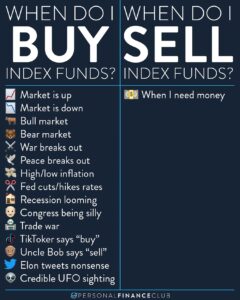
You hear me rant and rave so much about index funds, I figured it would be a good time to go over exactly what an index fund is!
The idea is pretty simple. Today an investor could open a Robinhood account and start picking and choosing individual stocks. I don’t HATE that, but stock picking is complex, time consuming, speculative, and leaves the investor very likely to perform WORSE than the total stock market. So what do you do? Buy EVERY SINGLE STOCK ALL AT ONCE.
It was a crazy idea when Jack Bogle (the founder of Vanguard) popularized the idea in the 1970s. But he made an overwhelmingly compelling case based on mountains of research. That research essentially says this: Any sort of “active management” where you’re guessing at which stocks to buy leaves you worse off. The one thing an individual CAN actually do to improve their investment returns is lower their fees. That’s where an index fund comes in. By buying EVERY stock, you diversify away all risk of stock picking, you guarantee yourself the full returns of the growth of the market, and you do so at nearly zero cost (The fees on index funds are super cheap).
My net worth is north of $5M these days. Some of it is in my personal home. Some of it is some other real estate or business. But MOST of it ($3M+) just sits in a few index funds. It takes basically zero work and zero time, yet I have the employees of every company on earth working hard to grow their companies, and all that growth and profit directly comes back to me in my index funds!
As always, reminding you to build wealth by following the two PFC rules: 1.) Live below your means and 2.) Invest early and often.
-Jeremy

 September Sale!
September Sale! 



